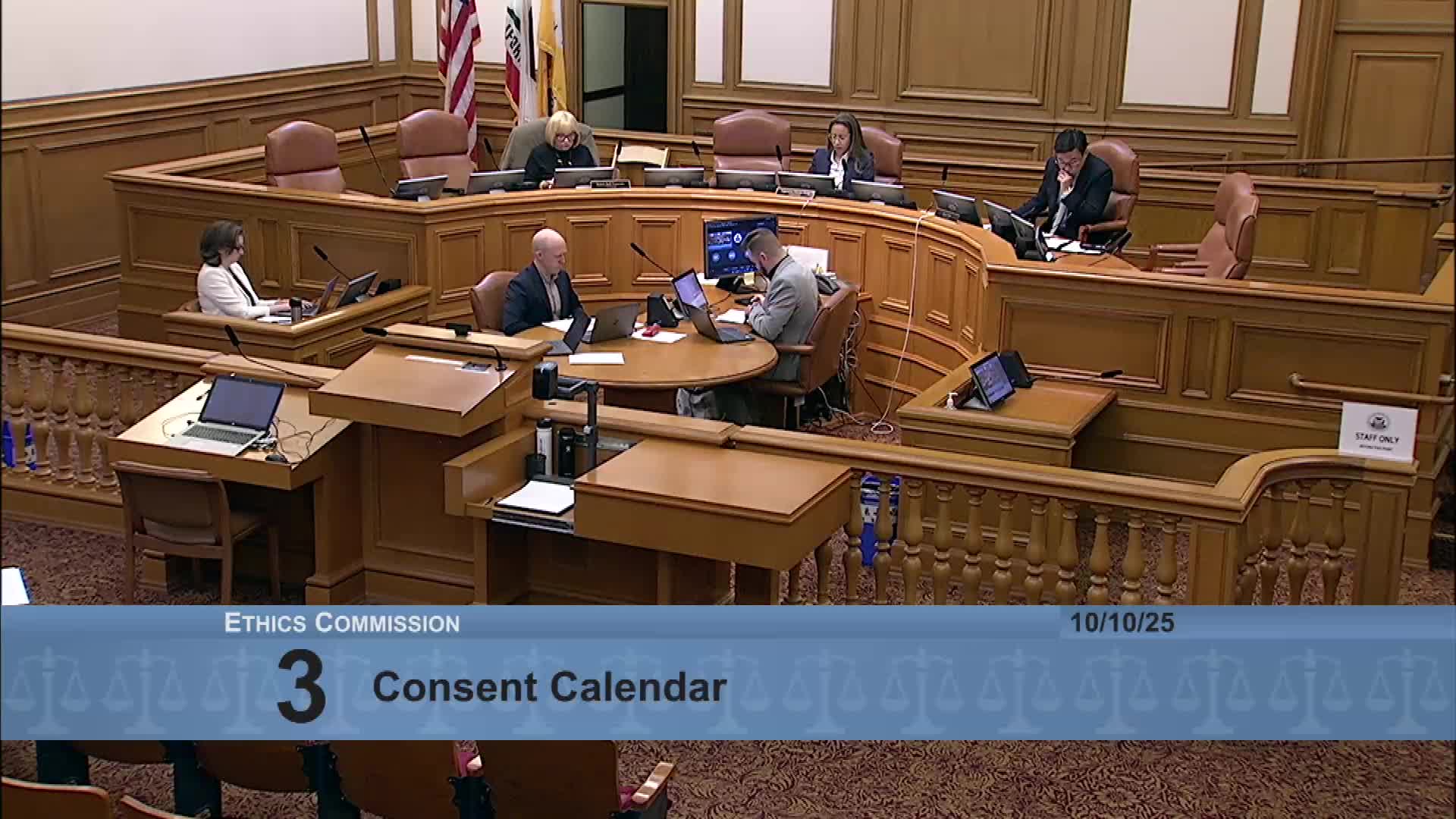Ethics commission delays decision on ordinance to let supervisors request behested‑payment waivers
Get AI-powered insights, summaries, and transcripts
Subscribe
Summary
The San Francisco Ethics Commission on Oct. 10, 2025, discussed an ordinance that would allow members of the Board of Supervisors to request behested‑payment waivers and voted 3‑0 to continue the item for further consideration.
The San Francisco Ethics Commission on Oct. 10, 2025, discussed an ordinance introduced by President Mandelman that would allow members of the Board of Supervisors to request behested‑payment waivers previously available to departments, the mayor and other elected officials. Policy and Legislative Affairs Manager Michael Panning presented the item and Melanie Mathewson, representing President Mandelman’s office, outlined examples and the sponsor’s rationale. After questions from commissioners, the commission voted 3‑0 to continue the item to its next meeting for further discussion.
The proposed change would alter language in the city’s campaign and governmental conduct code governing so‑called behested payments, a mechanism by which city officials may solicit donations for a public purpose only after a waiver is approved by the board or other authorized decisionmaker. Under current rules adopted after Proposition E (2022), the waiver process requires a public resolution that summarizes the solicitation’s purpose, identifies interested parties when known, finds the waiver would not create an appearance of impropriety and is in the public interest, and is posted to DataSF within 30 days. Panning told commissioners that waivers apply only prospectively and may last up to six months.
Mathewson said President Mandelman introduced the ordinance because supervisors are often closest to constituents and, as currently written, Proposition E explicitly prevents individual supervisors from seeking waivers. Mathewson said supervisors have encountered projects they could not support through behested payments, citing examples discussed during the meeting including local journalism support, immigrant legal services, expanded shelter beds, legal services for LGBTQ students, fire trucks, and neighborhood projects such as work around Harvey Milk Plaza. She told the commission the sponsor’s office believes allowing supervisors to seek waivers under the existing public‑interest standards would add a tool for addressing urgent needs amid a strained budget.
Commissioners pressed staff and the sponsor’s representative on gaps and compliance concerns that surfaced in a staff summary. Commissioner questions focused on how soon an interested party’s identity must be posted once it is known, why waiver resolutions vary in specificity, and why the mayor’s office has requested waivers relatively frequently. Panning and Mathewson said the code requires identification of interested parties “when the identity is known” at the time the resolution is considered, but acknowledged there is variance in how narrowly or broadly prior resolutions have described interested parties. Mathewson and Panning described legislative‑process checkpoints—public committee hearings and requests for reporting by listed parties—where further detail about solicitations is often revealed.
Executive Director Patrick Ford and staff described enforcement and remedies. The commission’s enforcement regulations and the code guide penalties, which may factor the payment’s size, history of noncompliance and whether advice was sought; the code’s maximum penalty is $5,000 or up to three times the amount at issue for extreme cases, staff said. Staff also noted practical limits on rescinding donations that were given to third‑party organizations after a solicitation; disgorgement of funds can be complex because those organizations, not the official, held the funds.
Panning described staff technical amendments included in the draft: correcting the chapter title to “Behested Payments” and an amendment (proposed by the sponsor) to require that a waiver resolution identify the positions of city employees or officers to whom the waiver would apply rather than naming individuals. Staff indicated they did not have substantial concerns about that clarification. The commission also discussed who determines whether a person or organization is an “interested party”; staff said the code definition applies and that the commission can provide advice on borderline cases and has enforcement authority if the definition is misapplied.
No formal action on the ordinance’s substance occurred. The commission’s final action on the item was a procedural motion to continue the matter to the next meeting; that motion passed on a 3‑0 roll call. The commission chair said the item could benefit from the presence of the two commissioners who were absent and therefore should be continued.
Votes at a glance
- Consent calendar adopted (motion to adopt consent calendar): Passed 3‑0 (Commissioner Yeh: Aye; Commissioner Francois: Aye; Chair Flores Fing: Aye). The consent calendar contained routine items listed on the meeting agenda and was adopted without separate discussion.
- Item 6 (behested‑payment waiver ordinance): Motion to continue to the commission’s next meeting: Passed 3‑0 (Commissioner Yeh: Aye; Commissioner Francois: Aye; Chair Flores Fing: Aye). No substantive vote on the ordinance or its amendments occurred at this meeting.
The commission did not set a new hearing date during the meeting; staff and the chair said the item would return for a future meeting so absent commissioners could participate in the discussion and vote.
